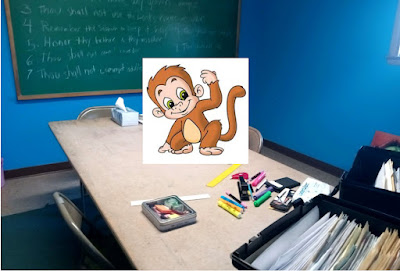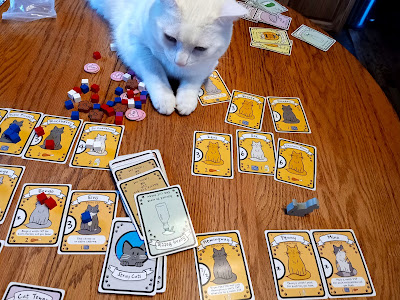Reflections - A Stressful Process
Five years earlier I had been the monkey in the room. Crowded around the small kitchen table in Nancy’s old farm house, I added columns of figures with no idea of what they meant. Nancy stood at the end of the table, took my totals, and pulled all-nighters to turn in final French Creek Township audit reports.
In my fourth year of auditing, Nancy showed signs of confusion and asked for my help. That gave me some insight into the process. But Nancy’s rapid decline and unexpected death left me in charge. Carol and I took auditor training. I assured the supervisors we could do the audit. As a result Carol, with only two years doing the meaningless adding, and I worked with Nancy’s replacement, Sandi. We made a pact. No all-nighters. And working every step together, the three of us successfully completed the 2021 audit.
This February, we gathered again in the room for Vacation Bible School at the Milledgeville Presbyterian Church to do the 2022 township audit. The ten commandments were written on the chalkboard. Rulers, pens, post it notes, and papers for balancing the state funds were spread over the table.
The first Thursday of the audit I attempted to assure Carol that she added value to our effort. “We’re a team. Everyone brings strengths.” I shuffled through the November checking account statement. “Yours is organizing. Your color coding makes us more efficient.”
“What’s getting me is the reports are organized differently this year.” Sandi made a left-handed check mark. “It would be easier to find things if the reports were organized like last year’s.”
“Jill’s new. She has her own way of doing things.” I bit my lip. I should have agreed with Sandi instead of trying to reason her feelings away. She had a valid point. In our township, no two audits are alike. This gave me the advantage. As a former teacher, I’m used to exploring and making mistakes—that’s how we encourage elementary school students to learn. Those techniques horrified Sandi and Carol. Both former nurses, they expected to learn one way of doing things. Patients could suffer or die if nurses made mistakes.
Keeping to the pact that Carol and I made when Nancy died, we verified transactions and balanced accounts in every detail—together. I hoped to retire, leaving Carol and Sandi qualified to balance the books so the township wouldn’t have to hire expensive public auditors.
But the process stressed me. The first two nights of the audit I woke hourly. Other nights I dreamed of holding a ruler under ledger lines. My stomach continually clenched as if I were straining to maintain the yoga boat pose. And I wrote about auditing in my morning journal searching for a way to keep the team together and focused.
Friday morning as I scribbled at my secretary desk, Ande jumped up beside me. Purring, he plopped his bottom on the left side of the composition notebook. He rested his front paws on the laptop keyboard.
Stalled over how to express the next thought, I jiggled the mouse to switch from the email tab to AccuWeather on the computer. I’d figure out what to wear then before writing more.
The computer didn’t respond.
I pressed my finger on the touch screen tab.
Still nothing.
Ande must have been pressing a key that blocked my access.
Still wondering what to wear, I shouted to the resident weather expert in the great room. “What’s the temperature going to be today, Spence?”
“Upper fifties, I think.”
“Thanks.” Ending my diversion, I concluded there was no way to reason Carol out of her feelings, but I might divert her into releasing some tension. Maybe I could get her to celebrate little successes like I did. The time we matched our state expenditures to the penny with Jill’s state report, for example, I wiggled my fanny, pumped my fists, and yelled woo-hoo. Carol and Sandi had exchanged tolerant smiles. If Carol would let out a whoop now and then, she might feel more relaxed about auditing.
Feeling pleased with my idea, I glanced over at Ande.
He was calmly observing a video of a bald eagle on the computer screen. Beak tucked under its wings, the back of the sleeping bird’s white head rose and fell among dark brown feathers. The video appeared courtesy of the Big Bear Bald Eagle Nest live cam in California.
 | |
| Ande Observing the Bald Eagle |
I had opened tabs for Gmail, Google Drive, and my farm journal on the computer. How did Ande select a bald eagle out of over a billion websites?
As soon as the auditors scraped their chairs into place around the table Friday, I blurted, “I’ve got a story to tell about what my cat Ande did today.
The two put their pens down and faced me. When I finished, Sandi smiled politely, but Carol squealed and clapped her hands. She wiped a slender finger under her eye and her rosy complexion lasted midway through a morning of verifying amounts of bills with numbers written on the general ledger.
She returned from our lunch break and said in a bubbling voice, “I told my husband about your cat. He laughed and laughed.” Carol slapped her thigh. “If you put a video of that on the internet, you’d get thousands of hits.”
The story of Ande’s eagle got Carol through auditing Friday.
Laughs came less frequently Monday. We tackled the credit card bills—Carol glaring at ledgers, Sandi inspecting bank statements, and me sifting through months of stapled bills. Starting with January seemed logical but proved disastrous.
“This makes no sense.” Carol slammed her pen on the ledger. “Why did they change credit card companies?”
“Damnation! The paperwork is worse than last year.” Sandi rolled her eyes toward the ceiling. “Sorry, Lord. I shouldn’t have said that in church.”
“It’s a new company and two people use the account this year, not one.” I flipped through the crumpled strips looking yet again for the January documents. “The old card belonged to Zina. Since she no longer works for us, we can’t keep using her card.” That fact satisfied the two auditors momentarily. Neither wanted to deal with the notorious past secretary who wrote fictitious reports.
I’d flipped through the bills long enough to realize that the January statement was missing. I would ask Jill to email us a copy. “Let’s look for the February charges and come back to January.” We managed to account for transactions in three months before my co-workers grew uneasy.
“This is taking a lot of time,” Carol said.
“It would make more sense to keep things the same.” Sandi grumbled. “Sorry. I’m venting.”
“Vent all you want.” They had expressed my feelings. “Get it all out.”
Carol and Sandi sang a nonsensical duet, stamped their feet, and grinned ear to ear. Then they dissolved into laughter that rang like pealing church bells.
Carol sighed. “Could we get a list of just the credit card transactions so I don’t have to flip through the whole ledger?”
Sandi closed the bank statements. “In the meantime we could work on general revenues.”
“Done.” I stuffed the credit card bills into a folder. “I’ll email Jill during our lunch break.”
After lunch, Carol straightened taller in her chair. “I’ve got something to tell you, Janet.” She paused as if swallowing a tablespoon of dill pickle juice. “I’m not understanding this.” She waved her hand at the plastic tote boxes holding the township folders. “I should know more by now. I’ve prayed to God.” She paused once more—as if praying. “I got my answer this weekend. I’m not running for auditor again. I could never do your job.”
Sandi flashed Carol an indulgent smile. “I can take over, but I’m not ready yet. So Janet has to run for re-election this year.”
Good grief! Running for election meant collecting signatures from registered Democrats in a township populated by Republicans. Besides having wanted to retire after my six year term, the thought of knocking on strangers’ doors to ask them to sign my petition gave me the willies.
At home, I vented.
Charlie waved his arms. “Don’t do it! You don’t like the work. You don’t need the money.”
“I never took the job for the money. I do it as a civic duty.”
“Of course, she’ll run. She complains but she’s venting.” Spence picked up Ande and put him in my arms. “I’ll help you get signatures.”
Petting the cat, I reflected on the stressful job of resolving messes—the auditors did pull together to get every detail right.
Ande nuzzled my neck.
If he could find an eagle on the world wide web, surely I could find at least ten Democrats in the township—even if circulating petitions made me feel like the monkey in the room.




